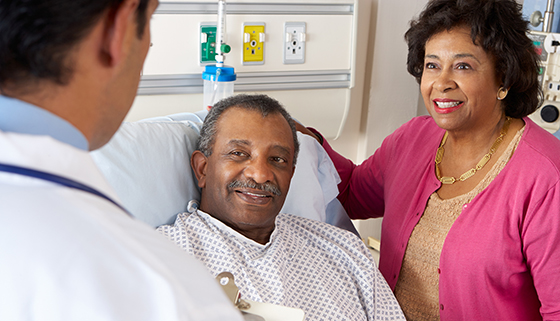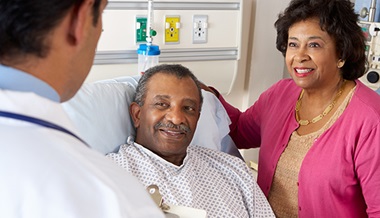What to Know About Stomach Cancer Surgery
Featured Expert
If your doctor has recommended surgery to treat stomach cancer, you may have many questions. Mark Duncan, M.D., is a Johns Hopkins surgical oncologist who specializes in stomach cancer. He has performed many surgeries to treat patients with various stages of stomach cancer.
Duncan answers some common questions patients have about what to expect after surgery and how to eat for a smoother recovery.
If I have stomach cancer, will I need surgery?
Patients with stomach cancer will need some type of surgery to effectively treat the disease. Occasionally, especially in very early-stage disease, a less invasive endoscopic procedure can effectively rid the body of stomach cancer entirely.
During this endoscopic procedure, a doctor:
- Inserts a flexible tube (endoscope) through the patient’s mouth
- Passes this tube to the affected area
- Removes all cancerous tissue with specialized instruments attached to the endoscope
For disease that has progressed past the early stage, more traditional stomach cancer surgeries can offer many treatment benefits or help make patients’ lives better, allowing them to eat and be more comfortable.
During stomach cancer surgery, a surgeon will:
- Make an incision along the patient’s abdomen
- Remove the affected portion of the stomach as well as surrounding lymph nodes and tissue, if necessary
Which procedure a doctor recommends after a stomach cancer diagnosis depends on many factors, including:
- Stomach cancer staging: To determine where the cancer is, a doctor will use imaging tests to see if (and where) the cancer has spread.
- A patient’s overall health: To make sure a patient is fit for major surgery, a doctor will conduct a thorough health history.
What does stomach cancer surgery entail?
The majority of stomach cancers found by doctors today has progressed past the early stage. Because of this, almost all patients with stomach cancer will require some type of surgery to treat the disease — either a traditional open surgery or a minimally invasive surgery.
The aim of surgery is to cure the disease. Surgery can also improve patients’ quality of life, allowing them to eat and be more comfortable.
To treat stomach cancer, a surgeon may perform a:
- Partial gastrectomy: This procedure removes part of the stomach. Doctors typically remove lymph nodes and fatty tissue as well to help ensure all the cancer is gone.
- Total gastrectomy: Doctors remove the entire stomach, surrounding lymph nodes and fatty tissue. Next, the surgical team connects the esophagus to the intestines. A surgeon may create a new “stomach,” or pouch, by folding over a portion of the intestines, to allow for more effective digestion.
Every surgery presents risks, and these procedures require precision. Choosing a doctor and care team with extensive experience treating stomach cancer reduces those risks.
What is the typical recovery process after a gastrectomy?
The recovery process will depend on how much of the stomach a surgeon removes. Patients who undergo a partial gastrectomy can expect to:
- Spend three to five days in the hospital after surgery
- Lose weight for one month to six weeks
- Resume normal (or near normal) eating patterns three to six months after surgery
For total gastrectomy, patients can expect to:
- Spend five to eight days in the hospital after surgery
- Lose weight for at least two months
- Adjust to a new dietary “normal” over the next several months, as the digestive system heals
- Take a multivitamin, such as calcium and iron, to avoid anemia
- Take a vitamin B12 supplement
After surgery, many patients experience dumping syndrome. These symptoms happen a short time after eating, when food travels too fast into the intestine. You may feel:
- Abdominal cramping
- Pain
- Diarrhea
- Lightheadedness
How can I improve symptoms after stomach cancer surgery?
Eating smaller, more frequent meals can improve or help prevent uncomfortable symptoms after a gastrectomy. A high-protein and low-carb diet may also help patients feel better after eating.
Adjusting to a new way of eating after stomach surgery can take time and patience. It may be helpful to know that uncomfortable symptoms such as abdominal cramping and pain generally improve or resolve with time. Many people are back to their normal (or near-normal) eating habits one year after surgery.





